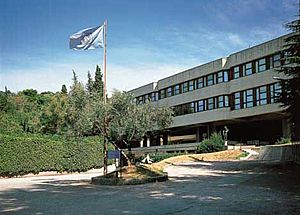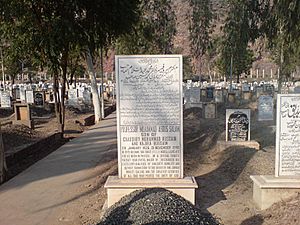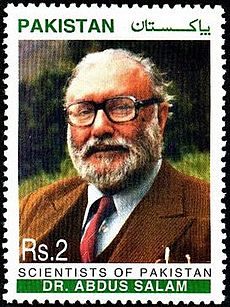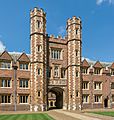Abdus Salam facts for kids
Quick facts for kids
Abdus Salam
NI(M) SPk
|
|
|---|---|
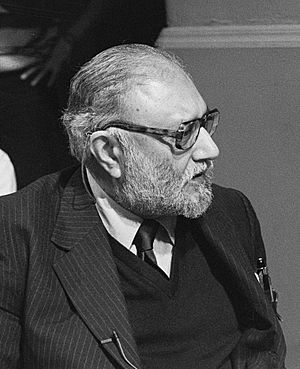
Abdus Salam in 1987
|
|
| Born | 29 January 1926 |
| Died | 21 November 1996 (aged 70) |
| Nationality | Pakistani |
| Alma mater | Government College University Lahore (BA) Punjab University (MA) St. John's College, Cambridge (PhD) |
| Known for |
|
| Spouse(s) |
Amtul Hafeez Begum
(m. 1949–1996) |
| Children | 6 |
| Awards | Smith's Prize (1950) Adams Prize (1958) Sitara-e-Pakistan (1959) Hughes Medal (1964) Atoms for Peace Prize (1968) Royal Medal (1978) Matteucci Medal (1978) Nobel Prize in Physics (1979) Nishan-e-Imtiaz (1979) Lomonosov Gold Medal (1983) Copley Medal (1990) |
| Scientific career | |
| Fields | Theoretical physics |
| Institutions |
|
| Thesis | Developments in quantum theory of fields (1952) |
| Doctoral advisor | Nicholas Kemmer |
| Other academic advisors | Paul Matthews |
| Doctoral students |
|
| Other notable students |
|
| Influences | Paul Dirac |
| Signature | |
 |
|
Mohammad Abdus Salam (born January 29, 1926, in Jhang, British India – died November 21, 1996, in Oxford, England) was a famous Pakistani theoretical physicist. He is best known for winning the 1979 Nobel Prize in Physics. He shared this award for his work on how two of nature's fundamental forces are connected.
Abdus Salam first studied at Government College Lahore and the University of the Punjab in Lahore. He even taught there for a while. Later, he went to Cambridge University in England to get his PhD.
In 1951, he returned to Pakistan. However, he felt disconnected from the global scientific community there. So, in 1953, he moved back to England. There, he began teaching and researching, especially focusing on how different forces in the universe might be related.
Salam believed that since there is one Creator, all the forces in the universe must also come from a single origin. He worked to combine the electromagnetic force (like electricity and magnets) and the weak nuclear force (which causes some types of radioactivity). He showed that these two forces are not truly separate. They can actually change into each other. This idea helped create the "electroweak theory," which explains how these forces are unified.
Contents
Helping Science Grow
In 1964, Salam started the International Centre for Theoretical Physics (ICTP) in Trieste, Italy. He led this center until 1993. His goal was to create a place where scientists from all over the world, especially from developing countries, could come together to do research.
In 1974, he also founded the International Nathiagali Summer College (INSC) in Pakistan. This college holds yearly meetings where scientists discuss physics and other scientific topics. These meetings still happen today.
In 1997, the scientists at ICTP honored Salam by renaming it the "Abdus Salam International Centre for Theoretical Physics". Salam also helped create other international centers to advance science and technology. He believed that "scientific thought is the common heritage of mankind." He felt that developing nations should invest in their own scientists. This would help them grow and reduce the gap between richer and poorer countries.
Even though Salam left Pakistan, he stayed connected to his home country. He invited Pakistani scientists to ICTP and kept a research program for them. Many important Pakistani scientists saw him as their teacher and mentor.
About His Life
Abdus Salam was a private person. He was married twice and had six children. Two of his daughters are Anisa Bushra Salam Bajwa and Aziza Rahman. His second wife, Professor Dame Louise Johnson, was a professor at Oxford University.
His Beliefs
Salam was an Ahmadi Muslim. He saw his faith as a very important part of his scientific work. He once wrote that the Holy Quran encourages us to think about nature's laws. He felt it was a great gift to understand even a small part of God's design.
When he accepted his Nobel Prize, Salam quoted verses from the Quran. He said that physicists believe the deeper they look into nature, the more amazing and wonderful it becomes.
In 1974, the Pakistan parliament made a change to its constitution. This change declared Ahmadis to be non-Muslims. Because of this, Salam left Pakistan and moved to London. However, he still kept in touch with scientists in Pakistan.
His Passing
Abdus Salam passed away on November 21, 1996, in Oxford, England. He was 70 years old and had a condition called progressive supranuclear palsy. His body was brought back to Pakistan. About 13,000 people visited to pay their respects, and around 30,000 people attended his funeral.
Salam was buried in Bahishti Maqbara, a cemetery for the Ahmadiyya Community in Rabwah, Pakistan. His grave is next to his parents'. The words on his tombstone originally said "First Muslim Nobel Laureate". However, the Pakistani government later removed the word "Muslim". This was because, under a law from 1984, Ahmadis are considered non-Muslims in Pakistan.
His Impact
Abdus Salam had a huge impact on science in Pakistan. Many scientists and students remember him as the "father of Pakistan's school of Theoretical Physics." He was seen as a brilliant teacher and an inspiring researcher.
Salam also founded the Space Research Commission of Pakistan and was its first director. In 1998, the Government of Pakistan released a special stamp to honor him. His old college, Government College Lahore, now has the Abdus Salam Chair in Physics and the Abdus Salam School of Mathematical Sciences named after him. He also played a big part in the search for the Higgs boson, a particle discovered in 2012.
Images for kids
-
St John's College, Cambridge is where Salam studied.
See also
 In Spanish: Abdus Salam para niños
In Spanish: Abdus Salam para niños


